
Each week, Joe (@bstolemyremote) and Terry (@gaylydreadful) review an episode of Showtime’s Penny Dreadful: City of Angels, alternating between our respective sites — queerhorrormovies.com and gaylydreadful.com.
Spoilers for episode six…
1.06 “How It Is with Brothers”: Tiago and Lewis interrogate Diego. Adelaide warns Molly about her personal desires. Townsend learns of Kurt’s surprising past. Peter Craft makes a dramatic decision about his marriage with Linda.
Missed a Recap? Episode 1 / 2 / 3 / 4 / 5
JOE
It’s weird when you receive exactly what you ask for and it still doesn’t deliver, Terry.
Last week, I suggested that Penny Dreadful: City of Angels should take a page from its predecessor’s playbook and dial back the expansive scope to focus on just a few members of its cast. “How It Is with Brothers” does just that, dedicating nearly its entire runtime to the interrogation of Diego Lopez (Adan Rocha), the fourth member of the Pachuco gang responsible for Officer Reilly’s death a few episodes back.
Oh sure, there are brief scenes with Sister Molly (Kerry Bishé) and her emotionally manipulative mother, Councilman Townsend (Michael Gladis) and his lover Kurt (Dominic Sherwood), Dr. Craft (Rory Kinnear)’s cruel treatment of his wife Linda (Piper Perabo), and an explosive scene inside the flophouse with the other Pachucos and Mama Vega (Adriana Barraza). But these scenes are brief, and exist either to keep some of the secondary plots chugging along in the background (Molly/Dr. Craft), or directly speak to the events occurring in the interrogation room (Townsend/Maria).
That also means that there’s virtually nowhere for “How It Is with Brothers” to hide: this is an all Tiago Vega (Daniel Vozatto) episode and, in that regard, it really clarifies just how dull our protagonist truly is.
The moral dilemma at the heart of the episode is that Diego tries to exploit Tiago’s relationship to Mateo (Jonathan Nieves) and the Chicano detective is, once again, caught between his allegiance to family – be they his Mexican family or his brothers in blue. This should be really meaty stuff because it gets to the heart of Tiago’s identity struggle, which has literally been his arc over the course of the season thus far. Instead of revealing new insights, however, it falls flat because it never goes anywhere.
The only truly exciting moment is when Tiago hangs out in the bathroom and debates whether or not to give Diego an empty gun, changing his mind after hearing his racist colleagues declare their plans to work Diego over like a piñata. The idea that Tiago might actually give a suspect a gun, never mind a loaded one, is meant to indicate the lengths he’s willing to go to protect his brother, but writer Vinnie Wilhelm can’t bring himself to pull the trigger.

Instead Tiago bashes Diego, revealing the truth about Mateo’s involvement to Detective Lewis (Nathan Lane) and paving the way for Lane’s (frankly exquisite) soliloquy. Diego then takes the fall for both Reilly and Hazlett’s murders, closing the case and turning both detectives into heroes. These final scenes are a great showcase for Nathan Lane, but the resolution takes the pressure off of Tiago, resolving him from having to actually pick a side.
Tiago has been too much of a blank canvas all season and just when it seemed like he might finally have to act, Wilhelm gives him a get out of jail free card instead. It’s frustrating.
Terry, how did you find Tiago’s moral struggle in the episode? Were you satisfied spending this much time on a single storyline? Were you happy when Captain Vanderhoff (Brent Spiner) finally acknowledged that Lewis and Tiago haven’t spent enough time solving Hazlett’s murder?
Finally, I don’t think we can discuss this episode without mentioning the elephant in the room: did you, like me, find it exceptionally difficult to give a shit about an episode dedicated almost exclusively to police corruption considering what’s happening in real life with Black Lives Matter and police violence?

TERRY
You certainly gave me a live grenade to think over, Joe, but it’s also an easy answer.
This episode cemented for me that I really don’t care about any of these main characters. Police violence wears heavily on me right now and you don’t have to look very far to see it. So to watch our heroes browbeat a man into not only accepting the crime they brought him in for, but also take the fall as a patsy for the Hazlett murders that began the show and have systematically been ignored unless it matters to the issue at hand was…pretty fucked.
I’m not sure what the intent of this episode was from a thematic perspective, but it comes at the worst possible moment as we are seeing the violence erupting on the streets against people of color at the hands of those who are supposed to serve and protect. It’s hard to care about Tiago’s moral struggle when he has become an active participant in the events. It was particularly chilling that the episode ends with Frank Murphy (Scott Beehner), a racist who whistled “La Cucaracha” (which literally means “The Cockroach”) while fantasizing about beating a man as if he’s a piñata, celebrating Tiago and Lewis’ interrogative prowess. And the two of them sharing drinks with a laughing police force.
We’re used to narratives about anti-heroes and watching their spiral downward, but here it feels different. Maybe because the characters don’t feel very well developed outside of stereotypes. Or maybe it’s because real world issues are coloring the episodes in a different light. But this was unpleasant to watch…and not the good kind of unpleasant either.
 And of course, mixed in with this interrogation are the white folk who are dealing with problems that are the antithesis of real problems. Molly, being torn between religion and doing what mommy wants, while her loins yearn for Tiago is the definition of privilege. Townsend bemoaning and rejoicing the fact that, in LA, you can walk down the street and see Fred Astaire but also that you can dream of being Fred Astaire is privilege. I guess that might be the point of these two B and C stories is to further clue in how fucked the situation is with the police and the truth behind these personal problems…but I don’t know if the narrative is really that interested in that.
And of course, mixed in with this interrogation are the white folk who are dealing with problems that are the antithesis of real problems. Molly, being torn between religion and doing what mommy wants, while her loins yearn for Tiago is the definition of privilege. Townsend bemoaning and rejoicing the fact that, in LA, you can walk down the street and see Fred Astaire but also that you can dream of being Fred Astaire is privilege. I guess that might be the point of these two B and C stories is to further clue in how fucked the situation is with the police and the truth behind these personal problems…but I don’t know if the narrative is really that interested in that.
Joe, I’m frustrated.
John Logan established this season with a lot of gray morality. He wrote the first four episodes before turning it over to other writers for these two episodes, but I feel like he didn’t give them much of a nuanced foundation to work with. It’s gray upon gray upon gray to the point that it feels monochrome and, what’s worse, establishing a “both sides” mentality that I don’t feel the narrative is equipped to handle with any sort of nuance. Hell, Diego even tells Tiago at one point, “Them or Mateo. You gotta fucking choose.” And like you mentioned above, he doesn’t. He gets saved from making that decision.
You’re absolutely right in your observation of Nathan Lane and his little monologue. That was a fantastic bit of dialogue and acting that was actually chilling to listen to when you take into consideration just how enticing his way of building up Diego was. If anything, Lewis is the more interesting character in this show because he’s trying to help his partner, over and over again. And the weight of those decisions, time and time again, shows on Nathan Lane’s face over and over.
I don’t know, Joe. I am curious about your thoughts of those other short scenes. Did you notice the way that Adelaide (Amy Madigan) and Molly’s discussion felt like a good cop/bad cop routine? Who do you think Molly meant when she covered the Chet Baker song and sang, “I guess he’s not for me”? Was it God or Tiago? And do we care? And here’s another live one to toss you: What do you make of Craft forcing Linda to go to a sanitarium?

JOE
I think as attentive and critical viewers, we can clearly see what Logan is trying to do with his female characters. There’s a lack of agency in their status, even incredibly powerful and influential white women like Molly are really only given a certain amount of slack to do what they like before they’re pulled in.
Same with Linda, whose status as the wife of a white doctor should afford her protection…until her husband takes a new lover, stamps her with the classic “intemperance and hysteria” label and ships her off to the rehab/looney bin. Even men like Townsend – rich, white, powerful – can be undone by the undesirable notions of his identity. I can see how these disenfranchised and put-upon people reflect each other’s struggle and the nature of the issues in John Logan’s sandbox…but it’s just not coming together.
More than any other recent show, I find the storylines that work are tied strictly to how compelling I find the performance. I have residual goodwill for Bishé from her time on Halt & Catch Fire; I’ve admired Lane for years and it’s exhilarating seeing him play a dramatic role worth his talent and as Maria, Barraza is underutilized, but hugely empathetic. Seeing Mama Vega calmly and cooly walk into that flophouse in an attempt to bring her youngest son home was a great moment, but narratively it’s shrug-worthy because we know how it will all play out before she even gets past Rio (Natalie Dormer).

As we enter the back half of the season, that final performer is possibly the one I’m most frustrated with. It’s definitely not Dormer’s fault, but I am so disappointed with how Penny Dreadful is (mis)using her. Consider this, Terry: Dormer plays FOUR (!) roles on this show and she A) barely gets any screen time, B) never gets anything to do and, as a result, C) never gets to make an impression. I’ll confess that I’m biased because I’ve followed Dormer’s career for years and I was so excited to see her in this show, but it’s hugely disappointing how badly the show treats an actress of her talent.
We know from reviews by Mexican critics that the show is problematic. We’re irked as queer critics about how tired Townsend’s storyline is. There are just so many elements of the series that aren’t working that it’s difficult to invest in these subplots and these characters, even when we like the performers. I should care more about who Sister Molly is singing about, or how she’ll get out from her mother’s oppressive thumb…but I’m struggling, Terry.
Sorry to close my section on such a woh-woh note. Was there anything positive that caught your eye in this episode? How long do you foresee Craft shacking up with Elsa before Linda’s absence causes turmoil for the boys? And one more incendiary question: does the show have a responsibility to be more careful with its use of racial slurs? Because the use of “ch*nks” sure as hell gave me pause.

TERRY
That word also shocked me out of writing for a moment, Joe, mostly because there hasn’t been an Asian presence on the show and using racial slurs like that – against a group that isn’t even represented in the show – is worse than problematic.
All of the racial slurs have bothered me, particularly how they’re used with casual disregard and are never really countered. Of course, it’s easy to see how Tiago, constantly pushed down and dehumanized by the people he works with, would have given up protesting. But I expect a show like this not to give up. And to confront those words instead of simply tossing them around to further prove just how bad the bad people are. So when you throw that word around, without any Asian representation, it just feels…disingenuous and monstrously off-putting.
You brought up Maria and I completely agree. She’s completely under utilized here, but her character might be the most interesting. Each episode, we’ve been getting further and further away from the Santa Muerte/Magda storyline, even as the narratives about “brother’s killing brothers” and incoming threats of war have strengthened Magda’s goal. But when Maria goes to the flophouse and sees Rio, it made me wonder if Maria is going to be the lynchpin in this whole story.

Each subplot as been kept relatively separate and, as a result, we’ve only ever seen Madga’s simulacrums in a vacuum, operating within their own subplot. With Maria seeing Rio and also working for Dr. Craft, it makes me wonder (and, honestly, hope) that when Elsa does move in with Dr. Craft, Maria will see what’s going on here. This may be hopeful projecting, but I can’t imagine someone as attuned to the supernatural clouds that have been forming around the City of Angels would miss the connection.
That’s what I’m holding onto, Joe: that we’ll get some clarity in the next few episodes. Maybe even with the appropriately titled upcoming episode “Maria and the Beast.” Regardless, we’ll be back at Gayly Dreadful next week.